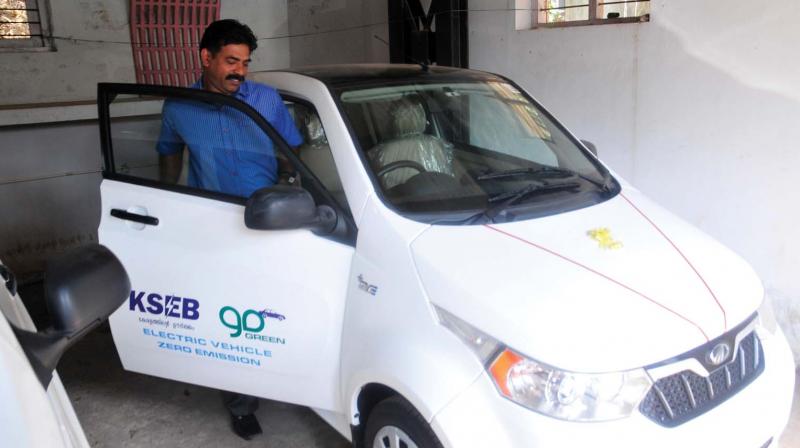KSEB rolls out electric cars in Thiruvananthapuram
There are two e2o cars each at KSEB's Distribution Circle in Ernakulam, and Kozhikode Vydhythi Bhavan, too.

THIRUVANANTHAPURAM: Beside the Mahindra e2o, even the Rolls-Royce Phantom will sound like the garishly painted freight truck that frequents the interstate highways. The two Mahindra e2o electric cars, parked in the eastern corner of the KSEB headquarters, Vydhythi Bhavan, at Pattom, are as silent as stealth. In the place of the fuel tank, they have a plug socket. There are two e2o cars each at KSEB’s Distribution Circle in Ernakulam, and Kozhikode Vydhythi Bhavan, too. All the six electric cars, bigger four-seater versions of Mahindra’s earlier Reva cars though as unassuming as a small car like Alto or Omni, have been purchased as part of KSEB Limited’s e-Mobility Project.
The car costs Rs 10.7 lakh but since the Centre provides a subsidy of Rs 1.2 lakh, KSEBL will have to shell out only Rs 9.5 lakh a car. “Our mandate is to make electric cars talked about in public,” said KSEB executive engineer Mr Shedilal C Gyara who is in charge of the e-Mobility project. KSEBL will rent out these cars to those interested in having a no-emission drive. “It will be more like a rent-a-car facility where people can come with their family and drive out. They will be charged nothing more than Rs 100 an hour,” Mr Gyara said. But for this renting process to begin, KSEB has to first set up fast-charging stations.
The plan is to have four such stations across the state, two in Thiruvananthapuram, and one each in Ernakulam and Kozhikode. While one of the charging stations in the capital will be at the Vydhythi Bhavan, the other will come up at Technopark. January 23 is the last date for submitting tenders for the setting up of fast-charging stations. “These are just pre-qualification bids and they will be opened on February 1,” Mr Gyara said.
It will take another month before the contract is finally awarded. After that, it will take six months for the setting up of the stations. The power for these stations will be generated from 30 kilowatt solar panels, the power from which will be fed directly into the KSEB grid. Because of the solar panel, each station is estimated to cost Rs 30.5 lakh. A fast-charging station can get the car charged in two hours. The charge will last for 110 kms.
“This makes travel to even Kollam a difficult task unless we have charging stations at least 50 kms apart across the state. So initially, we will be looking at a city-based drive,” Mr Gyara said. At the moment, these cars are slow-charged; the way a fridge or a clothes iron is charged, by plugging on the ubiquitous 15-amps socket. Problem is, it takes eight hours to get the car fully charged. Even if the charging time is reduced to minutes at a future date, electric car promoters will have to contend with the battery cost. They have a short shelf life of two to three years and are prohibitively costly.

